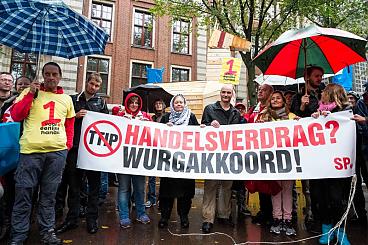Juncker to clip wings of Transatlantic Treaty
Juncker to clip wings of Transatlantic Treaty

President-elect of the European Commission Jean Claude Juncker wants to see the controversial dispute resolution system ISDS (Investor-State Dispute Settlement) eliminated from the free trade treaty between the US and the EU currently being negotiated, the Transatlantic Trade and Investment Partnership. His views were discovered by Dutch journalist Caroline de Gruyter of leading daily paper NRC when she spoke with him last Wednesday, when Juncker also said that he was looking to win back the public’s confidence. The SP has a few questions.
 SP Euro-MP Anne-Marie Mineur wants to know from the Commission what truth there is in De Gruyter's story. ‘This would be very good news, and not wholly unexpected,’ she says. ‘Juncker has already said that he finds it odd that a new arbitration committee is to be established. He is no supporter of private courts, because they don’t always have to justify their decisions. That is an astute criticism, and I would also celebrate this decision, all the more because we are hearing that the United States sees the ISDS as a pre-condition for the treaty.’
SP Euro-MP Anne-Marie Mineur wants to know from the Commission what truth there is in De Gruyter's story. ‘This would be very good news, and not wholly unexpected,’ she says. ‘Juncker has already said that he finds it odd that a new arbitration committee is to be established. He is no supporter of private courts, because they don’t always have to justify their decisions. That is an astute criticism, and I would also celebrate this decision, all the more because we are hearing that the United States sees the ISDS as a pre-condition for the treaty.’
Mineur considers that getting rid of the ISDS system could have implications for the rest of the treaty. ‘The whole agreement could fall as a result, and that would be really good news,’ she says. ‘We’ve fought hard against the TTIP, principally because it will be a death blow to measures protecting food safety, the environment and social rights. The system would undermine Europe’s precautionary principle, which ensures that only products that have been demonstrated to be safe can be put on the market.’
The Comprehensive Economic and Trade Agreement (CETA) with Canada also includes the ISDS system and Mineur wants to know whether it will be scrapped from that treaty also. ‘If Juncker wants to win back the public’s confidence, then that’s a no brainer,’ she insists. ‘Resistance is growing, and this really won’t subside if Juncker restricts himself to the free trade treaty with the US.’
